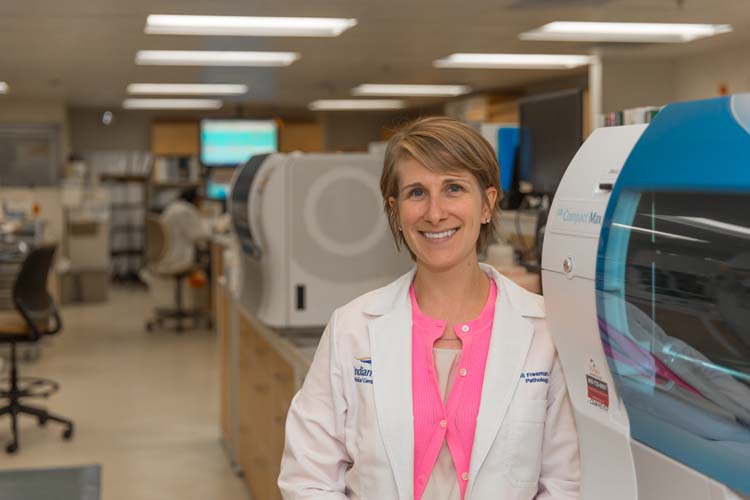Dr. Kali Freeman, hematopathologist and medical director at the Indian River Medical Center’s pathology department, isn’t prone to hyperbole.
So, when she starts using words like “incredible” and “exciting” and “impressive” about a new kind of diagnostic test, it’s probably time to start paying close attention.
For the record, the American Association of Medical Colleges calls hematopathologists like Freeman “truly the doctor’s doctor,” because they are board-certified in both clinical and anatomical pathology and, it says, “they form the basis of every physician’s thinking about the patient and that patient’s treatment.”
So what triggered Freeman’s initial outburst of enthusiasm? A newly-approved blood-based genetic test that may very well revolutionize the way cancer in general – and non-small-cell lung cancer in particular – is treated.
As the American Lung Association points out, “lung cancer (a non-small-cell type of cancer) is the nation’s leading cause of cancer deaths and every year 11,943 Florida residents are diagnosed with the disease.”
That’s where the “VeriStrat” blood test created by pharma company Biodesix comes into play.
Bloomberg describes Biodesix as “a molecular diagnostic company that discovers, develops and commercializes cancer tests that help patients and their doctors to make informed decisions about treatment based on a patient’s unique molecular profile.”
The company’s VeriStrat test was approved by the FDA in June 2016.
“It’s called a liquid biopsy,” says Freeman, “and it’s incredible.”
“For patients with lung cancer,” Freeman continues, “in order to make a diagnosis [and then determine a course of treatment] we have to go into the lung with a bronchoscope or with a CT-guided needle and take a biopsy. Then after we get the biopsy and pathology and process it, we do our specials stains and then we send it out for molecular studies.”
All of that takes time; usually at least a month and sometimes longer before treatment can begin. Until now.
Almost gleefully, Freeman points to a recent case at IRMC using the VeriStrat liquid biopsy.
“We had a patient recently in the emergency room who was found to have a mass – a lung mass – and within 11 days that patient was able to start [targeted] chemotherapy. Eleven days. I think right now the median national time from diagnosis to therapy is 30 days.”
The 19-day difference might not sound huge to some people, but time is not on the side of cancer patients and starting treatment sooner rather than weeks later can make a big difference in outcomes with aggressive cancers.
Freeman shares a personal story which – in no small part – explains her enthusiasm for the rapid diagnosis allowed by the new test.
“I’m very passionate about this,” she says. “When I was in medical school my mom was diagnosed with pancreatic cancer and it literally took her probably two and half months to start chemotherapy. She died a month and a half later.”
So what does this new VeriStrat test do? In short, tumors have their own DNA and “shed” tiny pieces of that DNA into the bloodstream. “Capitalizing on that,” Freeman explains, “the VeriStrat blood tests finds those little fragments of DNA, amplifies them and then looks for targetable mutations.”
Depending on the test results, the patient may be started on a program of Tarceva, a drug which interferes with the activity of a specific protein called “epidermal growth factor receptor,” or that same patient might be started on specialized chemotherapy or on some other gene-specific targeted therapy.
Again, it’s a time-saver and way of targeting cancer most effectively. The goal – in essence – is to avoid putting patients into therapies and treatments which, statistically, do not fare well against that patient’s specific type of cancer.
“I think it’s incredible,” Freeman repeats, but … “I think it’s going to take a couple years for the medical community to kind of adapt to it, because it’s a new way of thinking.”
“Right now we still have the traditional mentality of thinking the patient needs to have imaging and then needs to have a biopsy and then it goes to pathology and that whole process can take weeks,” Freeman says, “but with [these tests] the patient can have their bronchoscopy today and three days from now they could potentially know if they have the bio-markers to get special chemotherapy. So, it’s speeding up the process from diagnosis to therapy.”
“It is important to understand,” Freeman concludes, “that at this point we can’t use [these blood tests] to diagnose [the existence of] cancer. It’s only to identify mutations that will lead to targeted therapy,” but it’s also clear she expects that to change, too.
“There are people who are investing a lot of money into liquid biopsies,” she says, and someday in the not too distant future, a simple blood test may, indeed, replace biopsies and a host of other tests for finding, diagnosing and most effectively treating virtually all types of cancer.

